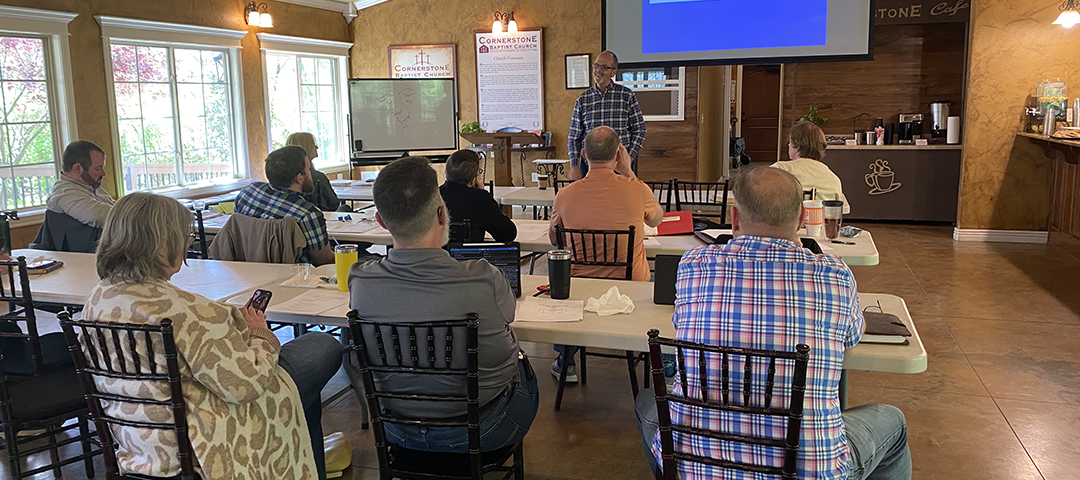
We Care with One Vision and One Team
July 16, 2024
Self-Assessment of Priorities
July 30, 2024By Larry Barker, VP of Church Strategy and Training
The entire context of the New Testament is one of multiplication. All healthy believers and churches will multiply. The multiplication of disciples is crucial in the formula for multiplication and that places the onus on the leader to be making disciples. If pastors and leaders are not spiritually healthy than unhealthy, with no multiplication, is what will be normal in churches as well. Acts 6:7 says, “And the word of God increased; and the number of the disciples multiplied in Jerusalem greatly;” Acts 9:31 continues, “Then had the churches rest…and were edified; and walking in the fear of the Lord, and in the comfort of the Holy Ghost, were multiplied.”
Russell N. Small in Church Revitalization states, “Revitalization is the supernatural work of God that restores health and vitality in a plateaued or declining church evidenced by submission to God’s word, right relations among members, and a renewed commitment to Great Commission ministry!” Notice those three paramount markers that cannot be ignored or by-passed and it must include all three. A commitment to the Great Commission is usually the most neglected. The healthiest churches are those that are outwardly focused on the one lost sheep and are living like Jesus pursuing those who are far from God
In The Multiplication Effect by Mac Lake he challenges us to focus on the why of multiplying leaders, not just the how and what. He asks, “Why do you want to develop leaders in the first place?” The most common answer is that we never have enough leaders and there are always more positions and jobs to fill than breathing bodies willing to fill the vacant spots. There is a biblical urgency because Jesus said the fields are white unto harvest and we are to pray for Him to send forth more laborers. Where do they come from? Out of healthy churches led by healthy leaders who are multiplying disciples, leaders, and churches.
Mac states, “The greater reason for developing leaders is to cultivate the God-given leadership gifts in others.” He continues, “When we’re driven by others’ potential rather than our pain, leadership development takes on a whole new feel.” Here is another great word of wisdom: “We don’t start with the position that needs to be filled; we start with the person that can be developed.” That is seeing leadership development through the lens of discipleship and how we can walk alongside someone to help them develop and be everything God intended them to be. The journey begins with you being the healthy pastor/leader He has called you to be.
The goal of this journey begins, continues, and ends with intimacy with Christ. It is being passionate about our personal relationship with Him becoming closer and more precious every day. Paul stated in Philippians 3:10 that his goal, his determined purpose, was to “know” Jesus. Paul was saying that he would pursue a relationship so close with God that he would walk consistently with Him whatever pressures, difficulties, or trials might come or occur. Paul desired to be in Jesus’ presence in order to experience sweet intimacy and deep fellowship with Him. It is the “one thing” that David said he asked the Lord for in Psalm 27:4.
Intimacy with God is the goal and discipline is the method or means for having intimacy with Him. It is how you discover it. Discipline is the word everyone admires (in those who have it) but few enjoy implementing because it requires sacrifice and surrender. Discipline is control gained by enforced obedience and the deliberate cultivation of intimacy with Christ. It requires leading by example so that others see it in you, not just hear you talking about it. Intimacy is never natural, automatic, quick, or easy. When you see someone who is intimate with God it is because they have dedicated themselves to cultivating that relationship. Are you leading by example?
Henry Blackaby states In Experiencing God – Day by Day, “We are so activity oriented that we assume we were saved for a task we are to perform rather than a relationship to enjoy!” For intimacy to occur there are two often overlooked disciplines we need to practice: silence and solitude. Donald S. Whitney defines silence as “the spiritual discipline of voluntarily and temporarily abstaining from speaking so that certain spiritual goals might be sought and discovered.” And solitude as, “the spiritual discipline of voluntarily and temporarily withdrawing to privacy for spiritual purposes.” Silence is the gateway to depth and solitude is the gateway to discovery.
These two disciplines are necessary for God-directed refreshment, health, and for spiritual refreshment, perspective, and recalibration to His agenda. Only in silence can you quiet your soul and only in solitude can you center your total focus on Him. It begins by leading yourself into His presence and allowing Him to shape you, mold you, and transform you! If we can help you or your church in any way please reach out to us as at Healthy Church Solutions. larry@bmaglobal.org or heidi@bmaglobal.org

